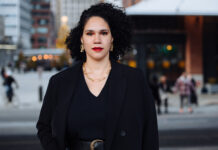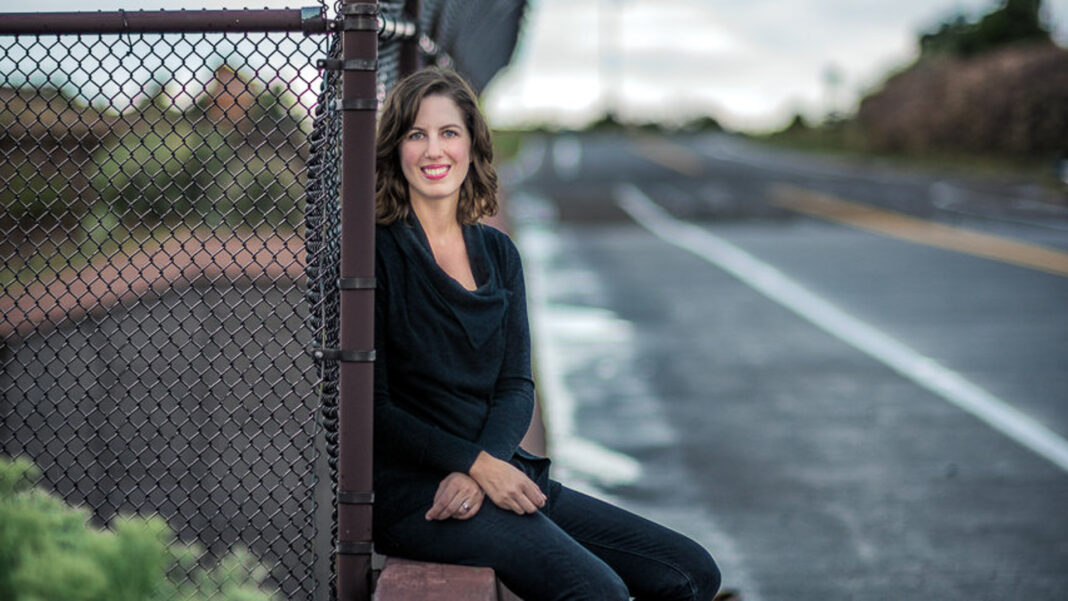Often times after a director has created a new opera production, (usually) he hands it off to an assistant for any revivals of that production. Sometimes a new director will come in several years later and put a fresh spin on the production. That’s exactly what Louisa Muller has done with LA Opera’s currently-running production of Richard Wagner’s Tannhaüser.
Ian Judge’s production of the opera had its debut in Los Angeles in 2007. Mark Swed, in his Los Angeles Times review said, “Los Angeles Opera — ever eager to seem an adjunct of Hollywood — advertises raunchiness, not redemption. Nudity is promised and delivered in quantity onto the Dorothy Chandler Pavilion stage.”

At lot has changed in 14 years and Muller knew that. She also had a different idea of how to present this story of a man seduced by Venus’s carnal delights but who seeks redemption from Elizabeth, a mere mortal.
As she told me earlier this week in a Zoom call, there were changes that could be made and how Wagner’s 1845 opera provides commentary on the times in which we live.
What follows are excerpts from our conversation that have been edited for length and clarity.
What are the challenges when you’re taking on someone else’s production of an opera and what freedom do you have in reworking aspects of it so that it feels like you’re not just there as a shadow director, but you’re actually the director of record?
It’s a really interesting question. Sometimes I’ve been in situations where I’m mounting a work where I was the original assistant director. And then you’re walking in with much more information about the original intentions of the director, of course. In the case of Tannhaüser, I was just really looking at an archival video, so that makes it very different.
I wasn’t in the room the first time they did it. I think in some ways that’s more difficult. And in some ways that’s less difficult because you don’t know exactly why every decision was made. So you can look at it a little bit more objectively and just see what works and what didn’t work as well and what my point of view on this scene or this moment is. Of course, the physical production already is there. So then every decision you’re making is within the confines of just what’s possible physically with the set and the costumes.
I think in any revival, it’s really important as the director in the room to really respond to the people that are in the room with you. Much of what we’re doing as as directors is really shaping the singer’s individual performances; shaping what the relationships are onstage. I always feel like regardless of what’s physically around them, that kind of work we can really do from scratch each time so that it really feels like the singers themselves can take ownership over it and are not just sort of doing what another singer did before.
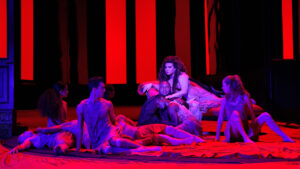
When it was first produced it seemed like there weren’t always a lot of costumes.
That’s true. My understanding of what happened before was that it wasn’t really dancing per se. They had a sort of a staging that was quite sort of orgiastic. We brought in Aszure Barton, who’s an amazing contemporary choreographer, and she then brought eight dancers, most of whom were already people that she’s worked with quite a bit.
We decided to make something that was quite quite a bit more about an atmosphere rather than sort of specifically just about sex. I think what we’ve created together is so beautiful. It is erotic as well, but in a way that I feel like is more sensual than literal.
How timely is this opera in which redemption is offered to characters at a time when cancel culture in our own society is rendering people without careers and livelihoods? And I’m wondering if you see ways in which this opera serves as a commentary for the world we live in today.
Certainly I think the sort of mob mentality in general. The other thing that I think feels really timely to me is the sort of religious society acting in a quite non-Christ like way. The sort of condemnation of somebody – I find that that feels very modern. I’m not a religious person, but the idea of giving people salvation or giving people the benefit of the doubt or giving people a second chance feels really important.
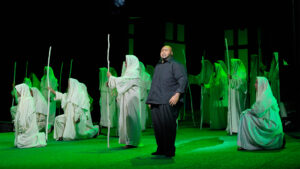
Cancel culture a lot is being made of that and I think obviously there’s, in some cases, a sort of overcorrection happening right now. But for me, it feels like that’s a necessary overcorrection to find our equilibrium of how do we handle second chances for people or how we do handle past transgressions. How we as a society can move forward from these events. And that feels like a thing we’re all really grappling with, aren’t we?
It’s hard to know exactly what redemption means for us now as a modern society. But I think the sacrifices that Elizabeth makes feel like they have something to teach us, which is endless love and patience.
I’ve done multiple interviews with people in all aspects of the performing arts, and they constantly say you’re not going to see as many people of color on stage until there are people of color in the offices making the decisions. Do you think sustainable change will happen without women and people of color in leadership roles?
No, I don’t. It feels to me like diversity in casting is a real sort of low hanging fruit, actually, and it’s really important. But I am worried that some people are just stopping there, because that is what audiences see. You can point very easily to a roster of singers and say, “No. Look. We have great diversity in casting.” I’ve been really heartened that there are several companies now that have just recently been taken over by women of color: Houston Grand Opera, the Portland Opera, Fort Worth Opera. That feels like really positive change.
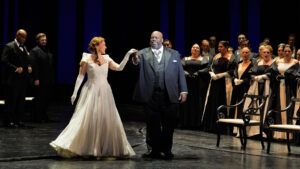
I was so struck by Morris Robinson [“Hermann” in Tannhaüser] saying that he had never been hired by a black person, never been directed by a black person and never even had a stage manager who was black. We know there are these disparities, but there’s something so concrete about that that just feels like it has to change right away. I am thrilled for so many amazing singers of color that are being given wonderful opportunities right now that they more than deserve. I just hope it doesn’t stop there.
So let’s conclude by my asking you about something that Wagner said. He said “Music is the inarticulate speech of the heart, which cannot be compressed into words because it is infinite.” What role do you have as director in making that inarticulate speech of the heart palpable for the audience?
It’s an interesting question, actually, because it’s why I’m drawn to opera specifically. The music is already its own. It already exists. Fully, wholly. I think what we’re doing as directors is [to be] this sort of spigot to bring it closer.
For me, it’s so much about a story. I completely believe in that quote, which is that you have a visceral reaction sitting in the house to the music itself. And then I think my role as director is to unlock something specific, more specific, so there’s a sort of universality to what you feel from the music. Then we find what’s the very specific story that fits with that because so often I think the most specific is the most universal. Even if it’s not our own specific story.
Issachah Savage, Sara Jakubiak and Lucas Meachem star in Tannhaüser. Three performances remain of LA Opera’s production on October 31st, November 3rd and November 6th.
Photo of Louisa Muller by Simon Pauly/Courtesy Louisa Muller


